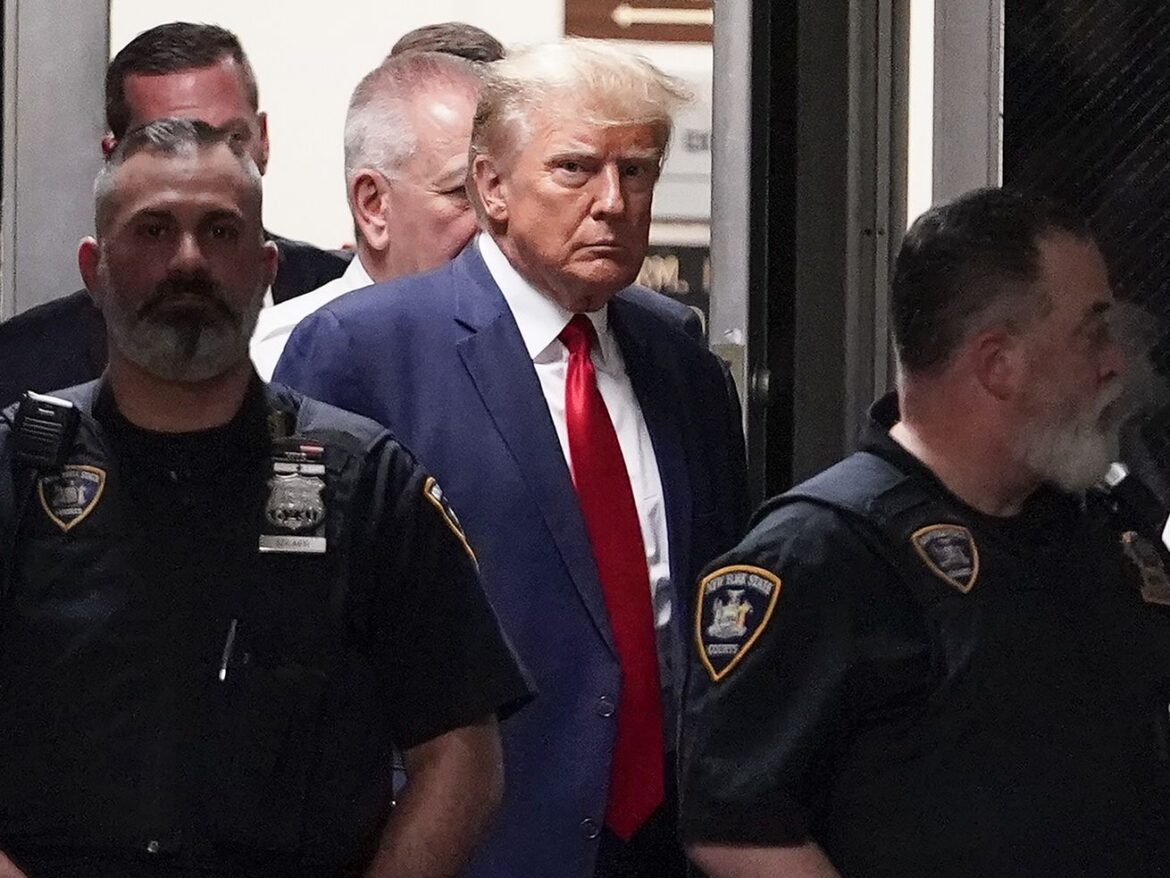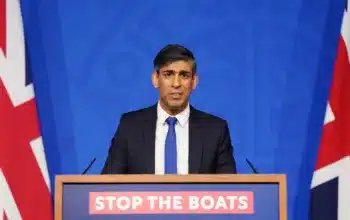Trump’s arraignment in New York is only the beginning.
Former President Donald Trump was arraigned in a New York court Tuesday on charges related to hush money payments made to the porn actress Stormy Daniels during his 2016 campaign.
It’s the first time in US history that a former president has faced criminal charges. And the indictment may only mark the beginning of Trump’s legal troubles given that he is the target of several additional ongoing civil and criminal probes.
The indictment includes 34 counts related to the falsification of business records.
There were no TV cameras in the courtroom per a request from Trump’s attorneys, who argued it would have created a “circus-like atmosphere.” After being fingerprinted, Trump pleaded “not guilty” to all of the charges, which he has claimed are evidence of a political “witch hunt.” He is expected to return to Palm Beach, Florida, later Tuesday to deliver a speech.
/cdn.vox-cdn.com/uploads/chorus_asset/file/24560937/1479794163.jpg)
Kena Betancur/Getty Images
On his way to the courthouse Tuesday, Trump posted on his social platform Truth Social that the experience was “so SURREAL — WOW, they are going to ARREST ME. Can’t believe this is happening in America. MAGA!” He did not speak with reporters on his way inside.
Trump may well be able to use the indictment to rile up his base and has already used the charges to drive a campaign fundraising blitz. While the indictment may help to fund his campaign, it’s hard to see how the charges — or the other cases looming over the former president — could benefit him or his party in a general election.
Ahead of the announcement of the charges, public opinion on Trump’s indictment was starkly divided along party lines, but still mostly supportive. An April 3 CNN poll found that 60 percent of Americans approved of the indictment, including 94 percent of Democrats and just 21 percent of Republicans, and 76 percent of Americans said that politics played a role in the decision to charge him.
But whether political or not, the charges could carry real consequences for Trump. He could face up to four years in prison for the falsification of business records alone (though serving time would be unusual for first-time offenders) and possible fines if convicted.
Why was Trump indicted?
Upon taking office last year, Manhattan District Attorney Alvin Bragg decided to resurrect the hush money case, which was initiated by his predecessor in 2018 but considered dead. Bragg’s strategy hinged on making Michael Cohen, Trump’s former personal lawyer, a star witness in the case.
Cohen handed over documents and text messages and provided testimony to a Manhattan grand jury detailing how the former president directed him to pay a total of $280,000 in hush money to Daniels and former Playboy model Karen McDougal, with whom Trump also allegedly had an affair, to stay silent during the 2016 campaign.
Daniels, whose real name is Stephanie Clifford, claims that she had a sexual encounter with Trump in his Lake Tahoe hotel room in 2006 after meeting him at a charity golf tournament. That was after Trump married his current wife, Melania Trump, who at that point had just given birth.
Trump has long denied that the encounter occurred. While he has acknowledged that he reimbursed Cohen for paying off Daniels to keep her quiet, he said in 2018 that was just to prevent her from publicly making “false and extortionist accusations” about their relationship.
In 2018, Cohen was sentenced to three years in federal prison and fined $50,000 after pleading guilty to criminal tax evasion and campaign finance violations in relation to the hush money payment.
How is the indictment affecting the 2024 presidential race?
Republicans largely rushed to Trump’s defense after news of the indictment broke. All but one of his 2024 Republican primary challengers have publicly opposed the decision to indict him. Former Republican Arkansas Gov. Asa Hutchinson, who jumped into the race Sunday, is so far alone in calling for him to withdraw his candidacy as a result, warning that Trump’s prosecution would become too much of a “sideshow.”
Now that the charges have been made public, it’s unclear whether any other Republicans will reverse their positions. Doing so would be politically risky given that they may face the wrath of the Republican base, which, as of Tuesday morning, had delivered more than $8 million in Trump campaign contributions since news of the indictment dropped.
But failing to do so might also doom the party in the general election, where President Joe Biden is planning to pitch himself as a figurehead of normalcy battling a GOP that has been co-opted by extremists — a strategy that has proved successful in beating back MAGA candidates in the last two elections.
Biden himself has remained silent on the subject of his predecessor’s indictment. In a rare gaggle with reporters outside the White House Friday, he refused to comment on the matter in four different ways. That’s a reflection of his thinking that presidents should not comment on pending legal cases, but also a deliberate means of conveying his steady-handed approach to voters.
What happens next?
The court case could extend well into the 2024 campaign season or even beyond the election. Trump has every incentive to try to delay the proceedings as long as possible and use them to paint himself as a political martyr. If the case goes to trial, his attorneys might argue that the case should be moved to another venue outside of Manhattan, where Trump is deeply unpopular and where a jury would likely be stacked against him.
Beyond the hush money case, Trump is also facing additional investigations that could yield further indictments and financial penalties.
Two of the criminal probes are being led by Jack Smith, a special counsel appointed by the Justice Department in November. One centers on Trump’s involvement in the January 6, 2021, insurrection at the US Capitol. It follows a comprehensive House committee investigation last year that concluded that Trump had incited the insurrection and conspired to defraud the US government, referring him and other associates to the DOJ for prosecution. If charged and convicted on that basis, Trump could face up to 35 years in prison and more than $500,000 in fines.
The other DOJ probe concerns Trump’s withholding of classified documents after he left office and possible obstruction of the government’s efforts to recover them, which could lead to an up to 20-year prison sentence. In August, the FBI executed a search warrant at Mar-a-Lago to retrieve documents, including many that were marked “top secret” and kept in an unsecured location. Trump kept those documents despite his lawyers claiming that he had already turned over all of the sensitive materials in his possession. At least one of them concerned a foreign government’s nuclear capabilities, raising possible national security concerns.
Separately, a special grand jury investigated Trump and his associates’ efforts to overturn the results of the 2020 election in Georgia. The jury has transmitted its final report to Fulton County District Attorney Fani Willis, who will decide whether to pursue charges. From the outset of the investigation, Willis zeroed in on a phone call in which Trump asked Georgia Secretary of State Brad Raffensperger to “find” the votes necessary for him to beat Joe Biden in the state. CNN reported that prosecutors are considering racketeering charges, which carry fines and a maximum 20-year prison sentence. Prosecutors are also reportedly weighing conspiracy charges, which carry a maximum sentence of five years and up to a $250,000 fine.
Trump is also facing a civil inquiry in New York centered on his business dealings. New York Attorney General Letitia James sued Trump, his company, and his three children for $250 million last year over alleged fraud, including lying about the value of the business, spanning a decade. A trial in that case is scheduled for October.
But even if all of these investigations may complicate Trump’s attempt to win the White House, federal charges could become moot if he wins. Under a longstanding Department of Justice policy, a sitting president cannot be charged with a federal crime. That’s why former special counsel Robert Mueller never considered whether Trump committed a crime as part of his investigation of Russian interference in 2016. But that policy technically only governs the DOJ, raising the unresolved legal question as to whether district attorneys could prosecute the president for state or local crimes.



